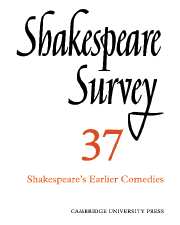Book contents
- Frontmatter
- Criticism of the Comedies up to The Merchant of Venice: 1953–82
- Plotting the Early Comedies: The Comedy of Errors, Love’s Labour’s Lost, The Two Gentlemen of Verona
- The Good Marriage of Katherine and Petruchio
- Shrewd and Kindly Farce
- Illustrations to A Midsummer Night’s Dream before 1920
- The Nature of Portia’s Victory: Turning to Men in The Merchant of Venice
- Nature’s Originals: Value in Shakespearian Pastoral
- 'Contrarieties agree': An Aspect of Dramatic Technique in Henry VI
- Falstaff’s Broken Voice
- ‘He who the sword of heaven will bear’: The Duke versus Angelo in Measure for Measure
- War and Sex in All’s Well That Ends Well
- Changing Places in Othello
- Prospero’s Lime Tree and the Pursuit of Vanitas
- Shakespearian Character Study to 1800
- How German is Shakespeare in Germany? Recent Trends in Criticism and Performance in West Germany
- Shakespeare Performances in Stratford upon–Avon–and London, 1982–3
- The Year's Contributions to Shakespearian Study 1 Critical Studies
- 2 Shakespeare’s Life, Times and Stage
- 3 Editions and Textual Studies
- Index
3 - Editions and Textual Studies
Published online by Cambridge University Press: 28 March 2007
- Frontmatter
- Criticism of the Comedies up to The Merchant of Venice: 1953–82
- Plotting the Early Comedies: The Comedy of Errors, Love’s Labour’s Lost, The Two Gentlemen of Verona
- The Good Marriage of Katherine and Petruchio
- Shrewd and Kindly Farce
- Illustrations to A Midsummer Night’s Dream before 1920
- The Nature of Portia’s Victory: Turning to Men in The Merchant of Venice
- Nature’s Originals: Value in Shakespearian Pastoral
- 'Contrarieties agree': An Aspect of Dramatic Technique in Henry VI
- Falstaff’s Broken Voice
- ‘He who the sword of heaven will bear’: The Duke versus Angelo in Measure for Measure
- War and Sex in All’s Well That Ends Well
- Changing Places in Othello
- Prospero’s Lime Tree and the Pursuit of Vanitas
- Shakespearian Character Study to 1800
- How German is Shakespeare in Germany? Recent Trends in Criticism and Performance in West Germany
- Shakespeare Performances in Stratford upon–Avon–and London, 1982–3
- The Year's Contributions to Shakespearian Study 1 Critical Studies
- 2 Shakespeare’s Life, Times and Stage
- 3 Editions and Textual Studies
- Index
Summary
The application of thought to Shakespearian textual criticism can still yield exciting results, as the new Oxford Henry V demonstrates. The coupling in a single volume (1979) of Modernizing Shakespeare’s Spelling, by Stanley Wells, General Editor of the Oxford Shakespeare, and Three Studies in the Text of ‘Henry V’, by Gary Taylor, Associate Editor, seemed arbitrary to some reviewers, but the two kinds of inquiry were complementary and they unite in the achievement of Taylor’s edition.
Wells had deliberated upon the difficulties faced by editors of modern-spelling texts. Recommending more thoroughgoing modernization than has been customary, he set down helpful guidelines toward rational and consistent practice. Taylor’s concern was with the relationship between the Quarto and Folio texts of Henry V and the nature of textual authority in the Quarto. Most scholars have agreed that behind the Folio Henry V lay Shakespeare’s foul papers, and behind the 1600 Quarto a memorial reconstruction or report. Taylor demonstrated the inadequacy of A. S. Cairncross’s case for supposing that F’s use of foul papers was indirect, by way of marked-up copy of a Quarto reprint. He found only the usual authorial loose ends in F, not evidence of the wholesale revision imagined by Dover Wilson and the new Arden editor J. H. Walter.
- Type
- Chapter
- Information
- Shakespeare Survey , pp. 202 - 220Publisher: Cambridge University PressPrint publication year: 1984
- 1
- Cited by

